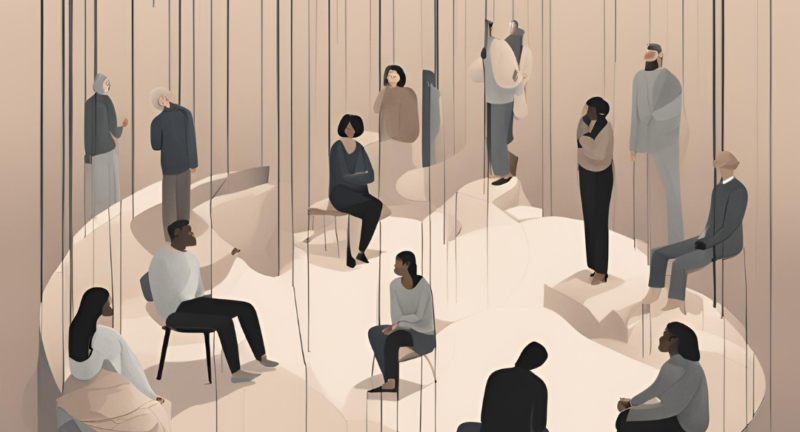
Living in Survival Mode: How Modern Age Reshapes Our Minds and Relationships?
In today’s fast-paced, hyper-competitive world, our bodies and minds are constantly subjected to the relentless demands of capitalism. The modern age forces our nervous system to navigate a world where rest is seen as laziness, productivity is the sole measure of worth, and scarcity is an ever-present reality. Under such pressures, our mental well-being is compromised, and our relationships suffer, leaving us feeling isolated and disconnected. From a relational and psychoanalytic perspective, it becomes clear that our psychological distress is deeply rooted in the societal structures that shape our daily existence.
The Modern Age Grip on Our Nervous System
Our nervous system, biologically wired for connection, safety, and homeostasis, is now entrapped in a perpetual state of survival. The demands of capitalism—deadlines, bills, unpaid labor, and the omnipresent hustle culture—push our bodies to their limits while constantly demanding more. This relentless pace forces individuals into hypervigilance, keeping their nervous system in a chronic state of fight-or-flight.
Consider how often you check your emails first thing in the morning, your heart racing with anticipation of missed deadlines. Or the way your stomach knots at the thought of an unexpected expense. These are not isolated experiences but rather symptoms of a system designed to keep you on edge, always preparing for the next challenge.
Recent comments from corporate leaders, such as L&T chairman advocating for a 90-hour workweek and Narayana Murthy suggesting a 70-hour workweek, reflect the deep-seated obsession with overwork. These statements reinforce the toxic cultural norm that equates long hours with dedication and success, despite the detrimental impact on mental and physical health. The capitalist framework infiltrates our psyche, shaping our internal narratives around self-worth and adequacy. The unconscious message embedded within these societal structures is clear: “You are only as good as your productivity.” As a result, individuals struggle with feelings of guilt and shame whenever they attempt to step back, rest, or prioritize their emotional needs.
The Impact on Relationships and the Self
In relational psychoanalysis, the therapeutic relationship itself is seen as a primary agent of healing. However, within a capitalist framework, relationships often become transactional rather than meaningful, driven by efficiency rather than genuine connection. When people are caught in the cycle of overwork and survival, the ability to engage in deep, emotionally nourishing relationships diminishes.
For example, a friend’s message asking to meet might feel like another task to squeeze into your packed schedule, rather than an opportunity for genuine connection. Conversations with loved ones may revolve around work stress, financial concerns, or future plans—leaving little space for emotional presence and authenticity.
Attachment theories suggest that our earliest relational experiences shape our sense of self and capacity for connection. Capitalism, by prioritizing individualism and competition, disrupts these attachment bonds and fosters a sense of isolation. In this way, our basic human need for connection and intimacy is deprioritized, leaving us in an emotional desert, longing for meaningful engagement but unable to access it due to exhaustion and stress.
The Illusion of Control and the Internalization of Capitalist Ideals
Capitalism thrives on the illusion of control. It convinces individuals that if they just work harder, plan better, or stay constantly “on,” they can achieve security and fulfillment. This belief aligns with psychoanalytic concepts of the superego—the internalized voice of societal expectations and pressures. The capitalist superego is unforgiving, pushing individuals toward unattainable ideals of success and productivity. It fosters an internal critic that constantly questions, “Am I doing enough?” leading to pervasive self-doubt and an ever-present sense of failure.
The internalization of these capitalist ideals creates a split within the self. One part strives for rest and connection, while the other feels guilty for not being productive enough. This internal conflict often manifests as anxiety, depression, and somatic symptoms such as chronic fatigue, headaches, and digestive issues.
Shame and the Need to Prove Worth
One of the most profound effects of capitalism on the psyche is the creation of shame—a deeply felt sense of not being enough. Psychoanalyst Donald Winnicott emphasized the importance of the “true self” and “false self.” Under capitalism, individuals often adopt a false self that aligns with societal expectations while suppressing their true desires, needs, and vulnerabilities. This results in a profound disconnection from the self and others, as individuals are forced to perform a role that keeps them alienated from their authentic selves.
Shame often arises when individuals cannot meet the unrealistic standards set by capitalism. They feel inadequate, not because they lack capability, but because the system is designed to foster feelings of insufficiency. This experience of shame becomes internalized, further entrenching the belief that self-worth is tied solely to output and external validation.
Breaking Free: Reclaiming Rest and Connection
Healing from the psychological impact of capitalism requires a conscious effort to reclaim rest, connection, and self-compassion. From a relational perspective, healing can occur through relationships that validate one’s intrinsic worth beyond productivity. Seeking therapy, engaging in meaningful conversations, and building communities that prioritize mutual support over competition can help individuals reframe their narratives around success and self-worth.
Consider setting boundaries with work, reclaiming time for activities that nourish your soul, and seeking relationships where you feel valued for who you are, not what you achieve.
Psychoanalytic therapy offers a space to explore and dismantle the unconscious internalization of capitalist values. Through this process, individuals can begin to recognize how societal pressures have shaped their self-perceptions and work toward reclaiming their autonomy and authenticity.
Moving Toward a Sustainable Future
As we navigate this modern world, it is crucial to challenge the pervasive belief that exhaustion is a prerequisite for success. We must advocate for systemic changes that prioritize human well-being over profit, recognizing that true mental health thrives in environments that honor rest, emotional expression, and relational depth.
By understanding the profound impact of capitalism on our nervous system through a relational and psychoanalytic lens, we can begin to foster healthier ways of living, working, and relating—ones that prioritize authenticity, connection, and true well-being.
Related Posts
Why Do We Always Push Ourselves Beyond Our Limits?
In today’s fast-paced world, the pressure to push ourselves beyond our limits...
Why Do We Struggle to Set Boundaries? A Relational Perspective
From a relational and psychoanalytic perspective, the difficulty in setting...


